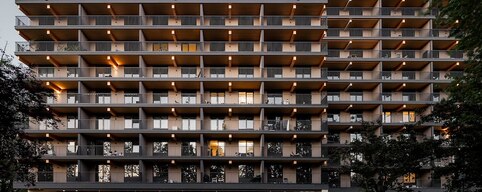

Gablok, a pioneering company based in Belgium, has introduced an innovative building system that promises to transform the construction industry. Drawing inspiration from the universally adored concept of Lego construction toys, Gablok has patented a system using wooden insulating blocks that effortlessly click together. This approach not only facilitates faster and more efficient building but also presents significant environmental and cost-saving benefits.
The concept behind Gablok’s construction system is as straightforward as a child's play. Taking a cue from Lego, the building blocks are designed for a simple and intuitive assembly process. This system allows individuals without specialized construction knowledge to participate in creating durable structures. With these wooden insulating blocks, participants embark on a construction journey that eliminates the intimidation often associated with traditional building methods.
By simplifying the construction process, Gablok removes the necessity for expertise and heavy, cumbersome machinery frequently required in regular building projects. This democratization of construction facilitates broader participation, meaning family members and inexperienced individuals can collaborate in building projects, transforming the overall experience into a satisfying and engaging activity.
The blocks are lightweight and easy to handle, reducing the physical strain on individuals involved in the building process. The absence of traditional mortar or cement means the system circumvents many complicated, time-consuming steps. This ease of use is a game-changer for the home construction sector, particularly in situations where time and labor resources are limited.
Moreover, Gablok's system appeals to those interested in self-building. Whether it's a personal home or a community project, the Lego-like approach simplifies the logistics, offering a viable, time-saving, and cost-effective alternative to conventional building methods.
Traditionally, buildings constructed with materials like concrete and steel are noted for their significant environmental impact. Gablok is challenging this norm. By utilizing wooden blocks, the system dramatically reduces the carbon footprint associated with building construction. Wood is a renewable resource, and when sourced responsibly, it presents a lower environmental impact compared to the extraction and processing of materials like concrete and steel.
The construction industry is one of the largest contributors to carbon emissions, primarily due to the production of these materials. Gablok's approach marks a shift towards more sustainable building practices by significantly reducing reliance on such materials. The lessening demand for concrete and steel correlates directly with a decrease in emissions, showcasing a more environmentally friendly path forward in the building sector.
Besides its eco-friendly impact, Gablok’s system also represents a remarkable leap in cost and time efficiency. Traditional building constructions require extensive drying times after mortar application, leading to delays and increased costs. In contrast, the Gablok system lets structures be assembled rapidly, as the blocks simply click into place without the need for additional time-consuming processes. A 200-square-meter house can be completed in just seven days, a substantial saving in both time and money.
Gablok's innovative approach has the potential to revolutionize the construction industry. By setting a new standard for fast and efficient building, it challenges the established methodologies. This could lead to widespread adoption of their system, as the industry increasingly seeks to balance the need for rapid construction with the urgency of reducing environmental impacts.
As more builders and developers become aware of the system’s advantages, Gablok's methods may very well become a staple in modern construction, aligning efficiency with sustainability. This innovation could signify the beginning of a significant shift in how the world thinks about constructing buildings, prioritizing eco-conscious decisions while maintaining practicality and cost-effectiveness. With such promising implications, Gablok is paving the way for a more sustainable future in the construction industry.



